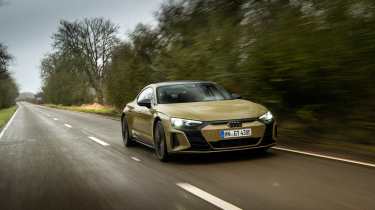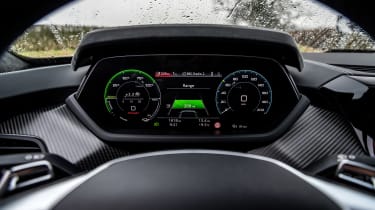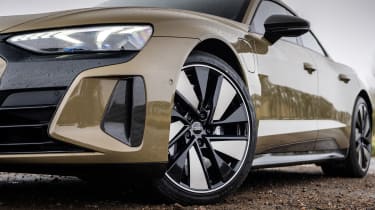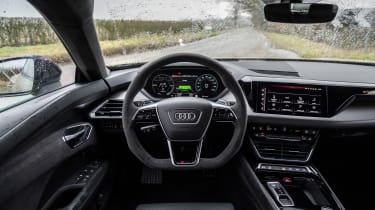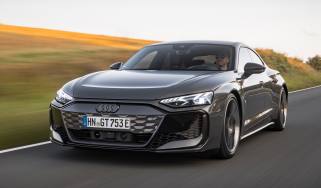Audi RS e-tron GT 2021 review – how does Audi’s take on a Porsche Taycan stack up?
Range-topping Audi RS e-tron GT benefits from Porsche Taycan DNA to be a superb grand tourer
Following its first forays into the world of electric vehicles with its e-tron SUVs, Audi has now pitched up to the EV saloon car market with a pair of e-tron GT models, topped by this Porsche Taycan Turbo rivalling £110,950 589bhp RS variant and underpinned by the £79,990 e-tron GT Quattro, which squares up against the more powerful, but more expensive, Taycan 4S.
Being part of the VW Group means Audi hasn’t gone out and spent a colossal amount of shareholder capital on an all-new platform, battery pack and motors, instead it’s phoned a family member and asked if it could use its resource.
> Audi e-tron GT quattro 2021 review – Porsche Taycan 4S gets a family rival
So where in the past Porsche has tweaked Audis (RS2) and Audi has built Porsches (924 and 944), this is the first time Ingolstadt has taken a Stuttgart product and turned it into one of its own. Which means it shouldn’t come as any great surprise to hear that the RS e-tron GT is as impressive as Porsche’s Taycan on which it is based.
Engine, transmission and 0-60 time
Like most Porsche Taycans, not one but two motors power the RS e-tron GT. There’s a 238bhp unit on the front axle driven by a single gear transmission, with a 456bhp motor on the rear axle that’s connected to a two-speed gearbox to improve acceleration times, with an electronic limited slip diff also standard.
Despite evidence to the contrary, the total output isn’t 694bhp (the combined total of both motor’s peak output), rather the RS e-tron produces 589bhp in normal mode with an overboost function that delivers 636bhp for 2.5sec when you floor it in Dynamic mode or engage launch mode. In power terms it sits between Porsche’s Taycan 4S and Turbo, as does the Audi’s 621lb ft torque.
All this power and torque means the 2347kg RS e-tron GT will reach 62mph in 3.3sec, the automotive equivalent of a prop forward outrunning a fly half.
More reviews
Battery capacity is 93kWh (83kWh net), as per the Porsche, which Audi claims will provide up to 283miles of range, although 200 was closer to the mark during our time with it.
Technical highlights
Built on the Taycan’s J1 platform, the e-tron GT’s body is also produced from a mixture of steel and aluminium. The front suspension compromises of aluminium double-wishbones, while the complex rear suspension is a multi-link set-up with three-chamber air springs and adaptive dampers fitted to all four corners.
Rear-wheel steering is an option on both models, with Audi’s electromechanical power steering plus system the default set up for the front axle. A set of tungsten carbide-carbon discs are also standard on the RS model, along with the 21-inch wheels of our test car.
You might be a little confused by the presence of gearshift paddles attached to the back of the steering wheel, but these are to allow you to adjust the level of regenerative braking rather than switch between rations of the rear axle motor’s two-speed transmission.
Being an Audi, the firm’s quattro four-wheel drive system forms part of the drivetrain set-up, with all four wheels permanently driven, unless efficiency mode is selected, when the e-tron GT becomes front wheel drive only.
Two charging sockets are provided, one on either flank positioned by the front wheel. Both ports feature AC charging connections, with the offside also offering a high-speed DC charging port.
The interior will be familiar to any driver of a higher end Audi model, which also might come as a disappointment to be in a car as advanced at the e-tron GT, but to still be looking at the same virtual cockpit and using the same HMI as you’ll find in an A6. But it works – it’s not trying to reinvent the wheel so in that regard perhaps Audi should be applauded for not changing something for change’s sake. Or it should be questioned for not going far enough to differentiate its electric cars from its ICE cars?
What’s it like to drive?
Far superior to Audi’s existing e-tron models, and not only because the GT isn’t an SUV. Where the GT shines is how every area of the car has a feeling of being designed to do the job in hand, rather than adapted to do so. Much like the Taycan it’s based on in that regard. And that sense of being in a car that’s been designed as a Porsche from the outset permulates through every control.
There’s a cohesion and synchronicity to how the e-tron GT operates. You sit low, although perhaps not as low as the roofline suggests, and the carbon fibre dressed cockpit and transmission tunnel hems you in, something that’s completely at odds with Telsa’s open plan approach to interior design. An alcantara steering is possibly the last thing you’d expect to see in an electric car, but as we all know alcantara adds at least half a star to any car’s rating…
What really strikes you is how well the e-tron rides and how precise its steering, damping and body control is. When you commit the nose to a corner there are no constant adjustments required to keep the front on track, the steering is precisely damped resulting in next to no kickback. There’s not a great deal of feel, if any in fact, but thanks to the linear response and the clean action of the rack you are able to steer the RS e-tron with a similar level of precision to Porsche’s Taycan.
Combined with a wholly unexpected level of body control, especially compared to something like the similarly priced RS7, this top level GT feels incredibly competent and surefooted. Yes it’s fast, quicker off the mark than pretty much all traditional sports cars, but the speed doesn’t dominate proceedings, so you’re able to work more with the car’s systems rather than purely rely on them to keep you pointing the right way up.
Cross-country, as with the higher end Taycan models, the RS e-tron GT can be a formidable weapon. But. Its weight is always against you. Always front and centre to how it gets in, through and out of a corner, requiring a full exploitation of that crisp steering, balanced damping and solid body control. It’s impressive rather than engaging. No matter how hard you try, how in-tune you try to be with the car, you always feel a step removed from the process of driving.
But hustling a 2300kg electric saloon-coupe along British B-roads isn’t the sole purpose of a car such as the RS e-tron GT. Or the Tayan, or Tesla’s Model S for that matter. I doubt it was even on page one of the engineer’s KPIs. These are sublime GT cars, well the GT and Taycan are – the Model S needs some quality injected into proceedings first.
Within the first few miles in the e-tron GT, I wanted to carry on for another couple of hundred, which might prove a stretch for the range. Audi claims a WLTP range of between 215 and 283 miles depending on spec, but experience suggests this is closer to 200 if you enjoy the performance on offer. But the silence, the relaxed nature and the calmness a car such as the RS e-tron GT exudes makes it a compelling proposition for those long days planned behind the wheel. Not that the UK’s charging infrastructure and its management is as resolved as the cars that need to use it, preventing you from taking full advantage of the GT’s biggest skill set.
Since their inception manufacturers have focussed on the performance of their electric cars, how they compare, and in most cases beat their ICE-engined equivalents. But acceleration is a tiny, almost irrelevant element of what makes a good driver’s car. There are still some who consider it a yardstick, but cars such as the e-tron GT deserve more than that. It’s not a driver’s car by a long shot, but it is, along with the Taycan, a mighty fine 21st century GT car.
Price and rivals
Despite its £110,950 asking price, it’s unlikely Audi will be making much of a profit so sizeable was the investment required in bringing the car to market. It’s possibly the same for Porsche with its £84,580 Taycan 4S and £115,860 Turbo models, where the RS e-tron GT sits inbetween in terms of performance. At £79,990 the entry level e-tron GT Quattro looks strong value compared to its RS brother, but it lacks the finer dynamic detail of the range topper.
A tri-motor Tesla Model S is due next year, costs £110,980, has the equivalent of 1020bhp, and will reach 60mph in 1.99sec – the last of those sounding as comfortable as sitting on a rusty spike. The Tesla also offers a superior range and a manufacturer supported charging network, but with deliveries of this latest Model S still nearly 18 months away, we’ll contain our enthusiasm until it’s won a few YouTube drag races.

